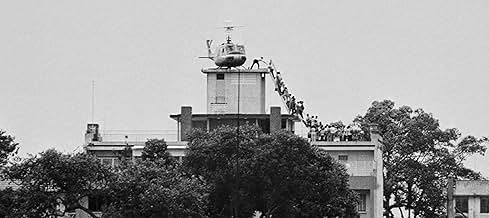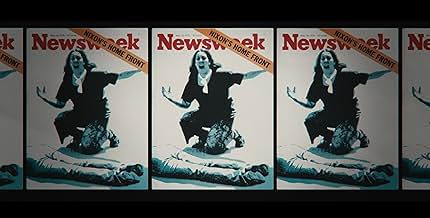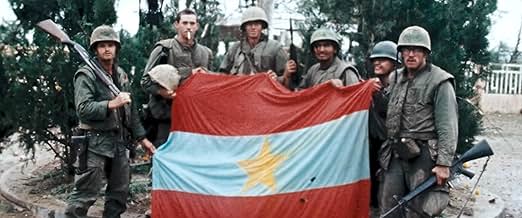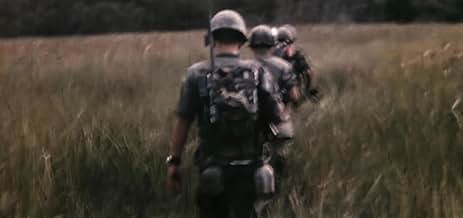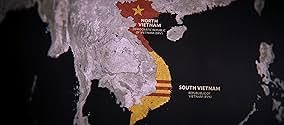Wendepunkt: Der Vietnamkrieg
Originaltitel: Turning Point: The Vietnam War
- Miniserie
- 2025
- 1 Std. 15 Min.
Füge eine Handlung in deiner Sprache hinzuThe Vietnam War's profound effects on American identity, causing social division and eroding government trust. More than military defeat, it transformed US politics and culture.The Vietnam War's profound effects on American identity, causing social division and eroding government trust. More than military defeat, it transformed US politics and culture.The Vietnam War's profound effects on American identity, causing social division and eroding government trust. More than military defeat, it transformed US politics and culture.
Folgen durchsuchen
Empfohlene Bewertungen
I really enjoy this kind of documentary, especially because its length - over five hours - allows it to take its time and properly explore a story from as many angles as possible.
What struck me most, personally, was that I ended up feeling sympathy and even a kind of sorrow for both sides. The filmmaker makes a real effort to stay as neutral as possible, showing the motivations - and especially the suffering - on both sides of the conflict.
One real eye-opener for me was what happened to the South Vietnamese who had worked with the Americans, after the US defeat and the communist takeover. It was shocking to see the consequences they faced. And what's more, the country is still divided in many ways because of this war - emotionally, politically, socially.
Neither side is painted as the bad guy.
What struck me most, personally, was that I ended up feeling sympathy and even a kind of sorrow for both sides. The filmmaker makes a real effort to stay as neutral as possible, showing the motivations - and especially the suffering - on both sides of the conflict.
One real eye-opener for me was what happened to the South Vietnamese who had worked with the Americans, after the US defeat and the communist takeover. It was shocking to see the consequences they faced. And what's more, the country is still divided in many ways because of this war - emotionally, politically, socially.
Neither side is painted as the bad guy.
There is no new insight here, and if you're familiar with the Ken Burns series, this is the lackluster remake. It duly covers the various turning points, from French loss to Tet to scuttled peace talks and Nixon's genocidal campaigns to name a few. We get various asides along the way; the student anti-war movement, the elections of '68, the treatment of returning veterans.
If it's your first comprehensive surveying of the Vietnam story, you will get the whole thing. It is, as usual, told from the American perspective; ill-advised entanglement in a faraway jungle, increasingly bitter and chaotic. There are also some Vietcong voices this time around.
There's so much that went wrong in a decade that to survey as we do, with talking heads, and condensing to snippets, makes it seem self-evident. There's no way to tell what a world would look like in which the CIA didn't lose the plot probably starting with Cuba, for example, or 'domino effect' thinking didn't win over in policy circles. And it's important to note how badly Washington misunderstood context; the generals did really think in terms of fighting in the Pacific Theater, but there the troops had been propelled by Pearl Harbor and fighting the good fight.
If it's your first comprehensive surveying of the Vietnam story, you will get the whole thing. It is, as usual, told from the American perspective; ill-advised entanglement in a faraway jungle, increasingly bitter and chaotic. There are also some Vietcong voices this time around.
There's so much that went wrong in a decade that to survey as we do, with talking heads, and condensing to snippets, makes it seem self-evident. There's no way to tell what a world would look like in which the CIA didn't lose the plot probably starting with Cuba, for example, or 'domino effect' thinking didn't win over in policy circles. And it's important to note how badly Washington misunderstood context; the generals did really think in terms of fighting in the Pacific Theater, but there the troops had been propelled by Pearl Harbor and fighting the good fight.
I have been a Netflix subscriber for years and years and this has to be the best documentary I have ever seen. It is so thoughtful and through, and honest.
I remember sitting in the high school auditorium with all the other male seniors to sign up for the Selective Service in 1972. The representative where really honest with us. It was during the time when the draft was based on the lottery system. They told us if your number was 100 or less, you would be drafted, if it was about 100, no worries. Mine was in 343.
I had to possibility of participating in history, but too dimwitted to understand what it meant.
Now I know, and the knowing makes me feel ashamed for our country.
Best line in the documentary is "We are the United States of Amnesia". Ain't it so, all you can do is weep.
This is a must watch, even for people that do not live in this country.
I remember sitting in the high school auditorium with all the other male seniors to sign up for the Selective Service in 1972. The representative where really honest with us. It was during the time when the draft was based on the lottery system. They told us if your number was 100 or less, you would be drafted, if it was about 100, no worries. Mine was in 343.
I had to possibility of participating in history, but too dimwitted to understand what it meant.
Now I know, and the knowing makes me feel ashamed for our country.
Best line in the documentary is "We are the United States of Amnesia". Ain't it so, all you can do is weep.
This is a must watch, even for people that do not live in this country.
I enjoy learning about 20th century American history, and the Vietnam War is one of my favorite documentary topics. I was initially concerned that this documentary would be filled with anti-American bias, however, it was much more balanced than I expected. The burning of villages by American/ARVN forces was discussed in one episode, for example, but it was also acknowledged that the North Vietnamese did a lot more of that kind of destruction. In one episode, a Viet Cong woman explains why she hated the Americans but also notes that many North Vietnamese didn't really understand what communism entailed. On the other hand, you had one million living in the North flee to the South when the civil war truce occurred, suggesting that many people did understand what life under communism meant (somewhat reminiscent of the East Germans escaping to West Germany, or maybe those Koreans living in the North who relocated to the South). To me this suggests the North Vietnamese victory was a pyrrhic one because while North Vietnam won, the people still didn't have most of the freedoms some people in the West take for granted nor the power. Of course, no more foreign control or interference. But I wonder if their lives changed for the better. We do know a million people from the South escaped (boat people) four years later.
Some critics have said that this documentary is a little too biased for their tastes. But I, someone who gets annoyed when I hear bias, didn't think so. To be sure, there was one guy in Episode 5 who annoyed me because I think he was being dramatic for the camera. Nevertheless, everyone else spoke in a measured way with occasional sincere emotions. All facts to me, and interesting perspectives, too. Some critics also suggest some important details were left out. I think this is true to some extent. No mention of the death of Ho Chi Min in 1969, for instance. I don't think General Giap was mentioned either. Still, I think for a five episode series, and given it's aim, it was wonderfully edited and directed. I love learning new details about subjects I'm already familiar with and this documentary did not disappoint.
I think the first 20-30 minutes of Episode 1 left me a little unclear how this documentary would play out. However, after that it started to grab my interest. As to be expected, there's a lot of sadness, grief, strife, and so on, on both sides. But don't take that as gratuitous anti-Americanism. Rather, I think the director was focused on telling a story from all points of view and how the Vietnam War permanently changed America and the relationship the American people has with their government because of it.
Some critics have said that this documentary is a little too biased for their tastes. But I, someone who gets annoyed when I hear bias, didn't think so. To be sure, there was one guy in Episode 5 who annoyed me because I think he was being dramatic for the camera. Nevertheless, everyone else spoke in a measured way with occasional sincere emotions. All facts to me, and interesting perspectives, too. Some critics also suggest some important details were left out. I think this is true to some extent. No mention of the death of Ho Chi Min in 1969, for instance. I don't think General Giap was mentioned either. Still, I think for a five episode series, and given it's aim, it was wonderfully edited and directed. I love learning new details about subjects I'm already familiar with and this documentary did not disappoint.
I think the first 20-30 minutes of Episode 1 left me a little unclear how this documentary would play out. However, after that it started to grab my interest. As to be expected, there's a lot of sadness, grief, strife, and so on, on both sides. But don't take that as gratuitous anti-Americanism. Rather, I think the director was focused on telling a story from all points of view and how the Vietnam War permanently changed America and the relationship the American people has with their government because of it.
As a British Army veteran with a longstanding interest in the Vietnam War, I approached Turning Point: Vietnam with the hope that it would offer a rich, balanced perspective on one of the most politically and morally complex conflicts of the 20th century. Unfortunately, what unfolds is a disappointingly narrow and overly Americanised narrative, filtered through a distinctly modern lens.
This series seems more interested in drawing parallels with today's ideological and cultural debates than offering a sober, historically accurate examination of the war itself. It applies 21st-century sensibilities to 20th-century geopolitics, and in doing so, misses the nuance, context, and texture that this subject demands. It felt less like a documentary and more like a vessel for contemporary messaging-at times bordering on revisionist history.
What's particularly jarring is the near-total absence of Vietnamese voices, both from the North and the South. The conflict, after all, was fought on their soil, among their people, and with devastating impact. The series gives little space to understanding the motivations of the North Vietnamese or Viet Cong beyond standard Cold War tropes, and barely touches on the tragedy of South Vietnam's fall. There's a living history here that is fading fast, yet the documentary doesn't seem interested in preserving or exploring it.
Likewise, Australia-America's most significant ally in the conflict outside of South Vietnam-is not mentioned at all. Over 60,000 Australians served in the war, with more than 500 killed. Their absence from this series further underscores the US-centric lens through which the entire conflict is portrayed. There's also scant reference to other contributing nations, such as South Korea, Thailand, or the Philippines, nor any deep analysis of the international ramifications of the war on post-colonial Asia.
The Vietnam War was never just a 'bad chapter' in American history, it was a global flashpoint, the culmination of colonial collapse, Cold War paranoia, and regional resistance movements. Any serious documentary on the subject should strive to examine not just what happened, but why, from all angles.
In the end, Turning Point, Vietnam feels like a missed opportunity. At a time when first-hand accounts are still possible, and when global perspectives are more accessible than ever, this series retreats into a familiar, overly simplified narrative. It does a disservice not only to viewers but also to the complexity-and humanity-of those who lived through the war on all sides.
This series seems more interested in drawing parallels with today's ideological and cultural debates than offering a sober, historically accurate examination of the war itself. It applies 21st-century sensibilities to 20th-century geopolitics, and in doing so, misses the nuance, context, and texture that this subject demands. It felt less like a documentary and more like a vessel for contemporary messaging-at times bordering on revisionist history.
What's particularly jarring is the near-total absence of Vietnamese voices, both from the North and the South. The conflict, after all, was fought on their soil, among their people, and with devastating impact. The series gives little space to understanding the motivations of the North Vietnamese or Viet Cong beyond standard Cold War tropes, and barely touches on the tragedy of South Vietnam's fall. There's a living history here that is fading fast, yet the documentary doesn't seem interested in preserving or exploring it.
Likewise, Australia-America's most significant ally in the conflict outside of South Vietnam-is not mentioned at all. Over 60,000 Australians served in the war, with more than 500 killed. Their absence from this series further underscores the US-centric lens through which the entire conflict is portrayed. There's also scant reference to other contributing nations, such as South Korea, Thailand, or the Philippines, nor any deep analysis of the international ramifications of the war on post-colonial Asia.
The Vietnam War was never just a 'bad chapter' in American history, it was a global flashpoint, the culmination of colonial collapse, Cold War paranoia, and regional resistance movements. Any serious documentary on the subject should strive to examine not just what happened, but why, from all angles.
In the end, Turning Point, Vietnam feels like a missed opportunity. At a time when first-hand accounts are still possible, and when global perspectives are more accessible than ever, this series retreats into a familiar, overly simplified narrative. It does a disservice not only to viewers but also to the complexity-and humanity-of those who lived through the war on all sides.
Wusstest du schon
- WissenswertesAired on the 50th anniversary of the Fall of Saigon.
- VerbindungenFollows Wendepunkt: 9/11 und der Krieg gegen den Terror (2021)
Top-Auswahl
Melde dich zum Bewerten an und greife auf die Watchlist für personalisierte Empfehlungen zu.
Details
- Erscheinungsdatum
- Herkunftsland
- Sprache
- Auch bekannt als
- Turning Point: The Vietnam War
- Produktionsfirma
- Weitere beteiligte Unternehmen bei IMDbPro anzeigen
- Laufzeit
- 1 Std. 15 Min.(75 min)
- Farbe
Zu dieser Seite beitragen
Bearbeitung vorschlagen oder fehlenden Inhalt hinzufügen



